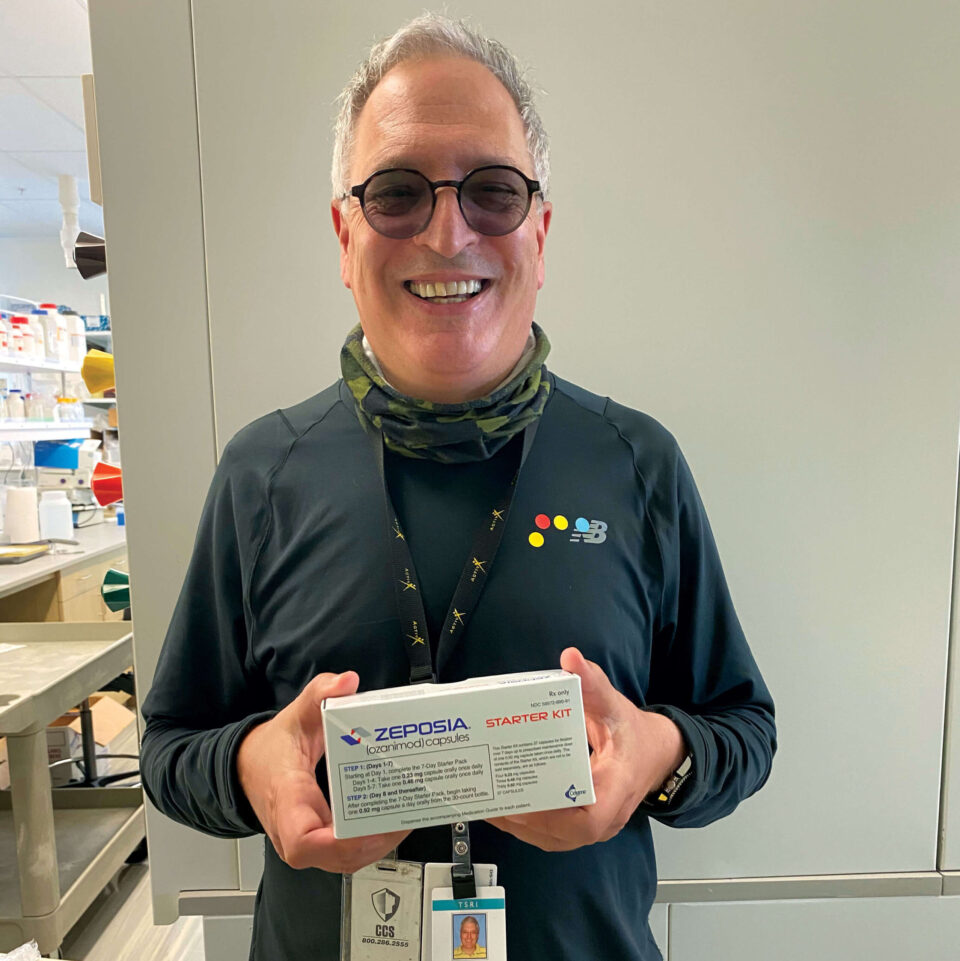Ozanimod, a drug invented at Scripps Research, wins market approval in U.S. and Europe for MS. The oral medicine also produced strong clinical data for ulcerative colitis, a form of inflammatory bowel disease.

“There are hardly any other academic institutions in the world that have the multidisciplinary expertise to discover a new disease-modifying compound and generate clinical data in support of its development.”
—Hugh Rosen, MD, PhD
It’s been an exciting nine months for the Scripps Research scientists who, nearly 20 years ago, began making a series of key discoveries that led to a new type of immune-regulating drug.
That drug, known as ozanimod, won FDA approval in March to treat adults with relapsing multiple sclerosis—the most common form of the disease. Less than two months later, the European Union’s drug agency followed suit.
Hugh Rosen, MD, PhD, who invented ozanimod along with fellow Scripps Research professor Edward Roberts, PhD, and their laboratory colleagues, called the back-to-back approvals “a celebratory milestone for the multiple sclerosis community, which is in need of new, intelligent drug interventions to help patients control the progression of their disease.”
Multiple sclerosis affects nearly 1 million people in the United States and roughly 700,000 in Europe. With the approvals, Bristol Myers Squibb could officially begin marketing the drug, which is sold under the trade name Zeposia.
But the favorable news didn’t end there. In early June, the drug hit yet another major milestone, demonstrating a clear benefit for patients with moderate-to-severe ulcerative colitis. Ulcerative colitis, a chronic disease of the large intestine, is part of a group of conditions known as inflammatory bowel diseases.
In releasing the results of its pivotal phase 3 trial—which involved more than 900 patients with ulcerative colitis—Bristol Myers Squibb said the study produced “highly statistically significant” outcomes.
“Results like this are gratifying to see,” Rosen says. “Based on the outcome of this pivotal trial, I am confident this approach will make a real difference for patients.”
Ozanimod is also in late-stage clinical trials for Crohn’s disease, another type of inflammatory bowel disease. While ulcerative colitis affects the colon and rectum, Crohn’s disease may act on any part of the gastrointestinal tract and also affect the entire thickness of the bowel wall.
Though multiple sclerosis is a vastly different condition than ulcerative colitis or Crohn’s, all three are a result of an overreactive immune system. Ozanimod works by acting on certain types of immune cells called lymphocytes that are centrally involved in autoimmune attacks.
In multiple sclerosis, the immune system mistakenly attacks the myelin sheath, the protective layer that surrounds nerves in the brain. This disrupts the flow of information within the brain and between the brain and body, bringing about symptoms that can range from numbness and bladder issues to vision problems and muscle paralysis.
In Crohn’s disease, the autoimmune attack occurs in the intestine, leading to symptoms that can include abdominal pain, bowel urgency, diarrhea and blood in the stool.

The fundamental discoveries that led to ozanimod were reported by Rosen, Roberts and their colleagues in a series of papers from 2002 to 2008. In 2009, Scripps Research licensed ozanimod to biotechnology startup Receptos, which Celgene purchased in 2015 for $7.3 billion. Celgene was acquired by Bristol Myers Squibb in 2019.
The ozanimod approval for multiple sclerosis is the latest in a string of FDA-approved drugs to originate from Scripps Research’s laboratories, following on the most recent approval of tafamidis for the rare but often fatal heart disease known as ATTR-CM.
Scripps Research also invented drugs that have been brought to market to treat more than a dozen other conditions with major unmet medical needs, including arthritis, lupus, respiratory distress syndrome, gastric cancer, metastatic non-small cell lung cancer, hemophilia, anthrax inhalation and neuroblastoma. Additional drugs are in development for more than 10 other conditions, ranging from osteoarthritis to Parkinson’s disease, with several in clinical trials.
FDA-approved drugs that arose from Scripps Research labs:
Zeposia®
is a once-daily oral medicine for patients with relapsing forms of multiple sclerosis
Vyndaqel®
treats a debilitating, often fatal heart disease caused by protein build-up
Surfaxin®
prevents respiratory distress syndrome in premature infants and injured adults
Humira®
is prescribed worldwide to treat arthritis and other autoimmune conditions
Benlysta®
debuted in 2011 as the first new lupus therapy in 50 years
Leustatin®
cures or offers a lifetime of remission for patients with hairy cell leukemia
Cyramza®
treats advanced gastric cancer and metastatic, non-small cell lung cancer
Monoclate®
based on the discovery of Purified Factor VIII, allows patients with hemophilia to lead practically normal lives
ABthrax™
is a first-in-class treatment for inhalation anthrax
Unituxin®
is used in combination with chemotherapy to treat pediatric patients with neuroblastoma, a rare brain cancer